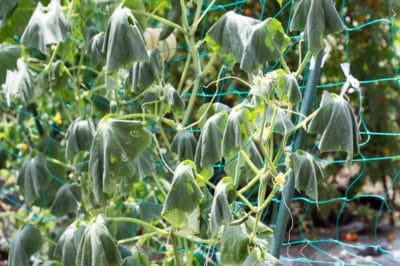About Cucumber Beetles
The cucumber beetles that arrive in your cuke patch in spring have overwintered in nearby debris, trash and compost piles. Weeds fed them as they waited for your cukes to get big enough to eat. The intruders may be one of three cucumber beetle species:
- Spotted cucumber beetles have yellow abdomens, black heads, thoraxes, black spots on their wing covers.
- Striped cucumber beetles sport black abdomens, black heads and black stripes on greenish-yellow wing covers.
- Banded cucumber beetles have black thoraxes, red heads and horizontal green stripes on their wing covers.
Cucumber Beetle Damage
At the minimum, adult cucumber beetles chew unsightly holes in cuke leaves and flowers. Beetle larvae weaken or kill cuke seedlings by devouring their roots. But this damage pales in comparison to an outbreak of cucumber wilt disease.
Beetles and Bacterial Wilt
Bacterial wilt germs overwinter in cucumber beetles’ digestive tracts. As soon as your cucumbers are big enough in spring, the insects swarm to them to feed. Rainwater or dew moves the germs from the beetles’ waste into the damaged plant tissue.
Wilt Symptoms
As the wilt bacteria move through a cuke vine, the leaves start wilting one by one. At first, they may perk up at night but wilt again in the heat of the next day. Without intervention, wilt kills whole branches — and eventually, the entire vine.
What to Do When Wilt Strikes
Only quick action might save a wilt-infected cuke. Prune the chewed, wilting leaves and stems immediately, before the disease consumes the entire branch. Always disinfect your pruning tools in rubbing alcohol between cuts and when you finish.
Expert gardener’s tip: Remove and destroy severely infected cukes. It’s the only way to the beetles from passing it to other plants.
Wilt Prevention
Keep cucumber beetles away from your seedlings by draping you cuke patch with lightweight, permeable fabric row covers available at your garden store. Spread the covers over the soil after planting your seeds and anchor them with garden-fabric. The growing seedlings lift the covers naturally while the fabric keeps the beetles out.
